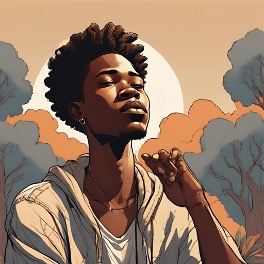
826 Valencia & The Mix
Writer of the Month
We are excited to announce Sa’veon Bishop as our Writer of the Month! Sa’veon’s insightful poem was created for the KQED Youth Media Takeover Challenge and highlights his feelings as a young Black man in today’s society.

I, Too
I, Too sing, America.
Grow humongous and strong, they try to prey on the weak,
We don’t “look the same” and “you will never be” they say to me
Who would guess a black man to make a difference
Who would guess a black man could love his difference
But they’ll see my act in change,
And ask, “How could this man stand up to me?”
I will not move, as motionless as a tree
As God would not let this way of living deprive me.
I, Too, belong for I am human just like you
I, Breathe I, Smell I, Grieve
I, Bleed I, judge I, love I, imagine
And I, Too, am just as powerful to speak
And was placed here for a Purpose.
For it's not a sign of Bitterness
Or from a place of judgement.
But an understanding
For being accepted.
I, Too, belong and more like me
They are accepted and invited in with open arms
I see what others have and the life that sets them at ease
Calm, quiet, and in harmony.
The kitchen table is not where my journey begins.
But where I can find peace.
I, Too Sing, America.
Author bio: Sa’veon was born in San Francisco, California, on Harbor Road in the Bayview Hunters Point neighborhood. Now eighteen years old, he is known for his strong work ethic, leadership qualities, and thoughtful planning. He learns from his mistakes and uses them as stepping stones to grow stronger. While he enjoys playing video games occasionally, his real passion lies in sports. Whether it's basketball, football, or track, he loves being active and competing with friends or as part of a team. Sa’veon is a natural competitor who brings intensity and focus to everything he does. Looking ahead, he plans to study business management in college with the goal of taking on a leadership role in his own business or within other organizations. He dreams of launching a clothing brand that inspires and motivates people to push through their struggles and keep moving forward.

